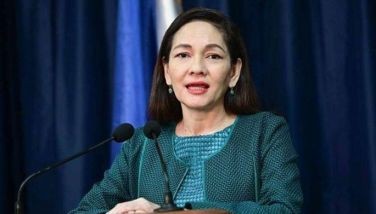Before UNHRC, Remulla denies claims of shrinking civic, media spaces
MANILA, Philippines — Justice Secretary Jesus Crispin Remulla denied that civic and media spaces are shrinking in the Philippines, which he described as "a vibrant democracy where freedom of expression, including the right to hold dissenting opinions, and the right of peaceful assembly is protected."
Remulla said this during the adoption of the recommendations of the Working Group of the Universal Periodic Review of the Philippines of the United Nations Human Rights Council.
"Let me say this in no uncertain terms. There is no state policy to attack, harass or intimidate human rights defenders, lawyers and other practitioners of the legal profession, and members of the media," the justice chief said.
"Extrajudicial killing is not state policy. Classifying a death that occurred during an anti-illegal drug operation as extra-judicial killing by default runs counter to the tenets of due process and the rule of law. We will never tolerate the abuse of power and use of force beyond the bounds of law."
The Philippine National Police has admitted that 46 have now died in President Ferdinand "Bongbong" Marcos Jr.'s iteration of the Duterte-era war on drugs.
READ: Duterte 'drug war' still hot topic as Marcos admin faces UN rights review
In the Committee to Protect Journalists' 2021 World Impunity Index, the Philippines placed seventh in the list of countries “where journalists are murdered and the perpetrators go free.”
But Remulla went on to claim that the country "has the unfortunate distinction of dealing with the longest-running armed communist insurgency in the world, whose adherents deliberately blur the lines between civic activism and armed violence.”
He also assured the council that the government is determined to end the communist insurgency "by addressing its root causes through a whole-of-nation strategy anchored on good governance, rule of law, social justice that will effectively uplift human dignity, and the quest for lasting peace.”
Adopted recommendations
Remulla also announced that the Philippine delegation accepted some 200 recommendations, more than two-thirds of all the recommendations handed out during its universal periodic review.
Among the adopted recommendations are those regarding:
- the UN Joint Program
- the Philippine Commission on Human Rights and a National Human Rights Action Plan
- combating discrimination and gender-based violence,
- maintaining a moratorium on the death penalty
- preventing extra-judicial killings and conducting independent investigations,
- decongesting prisons and further expanding access to justice
- protecting human rights defenders and journalists,
- promoting the rights to education, health, and an adequate standard of living,
- upholding the rights of persons with disabilities, indigenous peoples, women, children, refugees, and stateless persons.
Remulla also called on developed countries to donate additional funds for the mitigation of the impacts of climate change on underdeveloped countries.
"The Philippines has always believed in the indivisibility and interdependence of all human rights. No other challenge demonstrates this better than climate change and its adverse and compounding impacts on human rights. Environmental rights defenders are partners in promoting climate goals and their freedom and safety should certainly be protected," he said.
RELATED: G20 is holding a summit in Bali this week. What that could mean for the Philippines
"But let us not lose sight of the bigger issue which is, that all countries must faithfully and urgently fulfill their international obligations on climate action. The Philippines reiterates its call for climate justice – for developed countries to increase financing for mitigation, adaptation, and loss and damage for developing countries. We expect nothing less from our friends and partners that have been the beacon of human rights and justice the world over."
CHR: Past human rights challenges still unsolved
In a separate statement, the Commission on Human Rights pointed out that the UN Office of the High Commissioner on Human Rights released a report in June 2020 on the human rights situation in the Philippines citing "persistent impunity" with some 8,000 alleged extrajudicial killings linked to the drug campaign, alongside other killings of human rights defenders, journalists and trade unionists.
Former Justice Secretary Menardo Guevarra announced during the 44th session of the UN Human Rights Council in the same month that the government was already investigating the thousands of deaths linked to the drug campaign towards seeking accountability from its perpetrators.
"While it is imperative to address present human rights challenges, the UPR similarly brings into light the conditions in the last five years that continue to impact the way Filipinos enjoy their rights today," the CHR said.
"With the Philippine government affirming the UN Joint Program on Human Rights in the recent UPR, we look forward to the fulfillment of the commitment to institute reforms not only prospectively, but also those from the past."
- Latest
- Trending

































